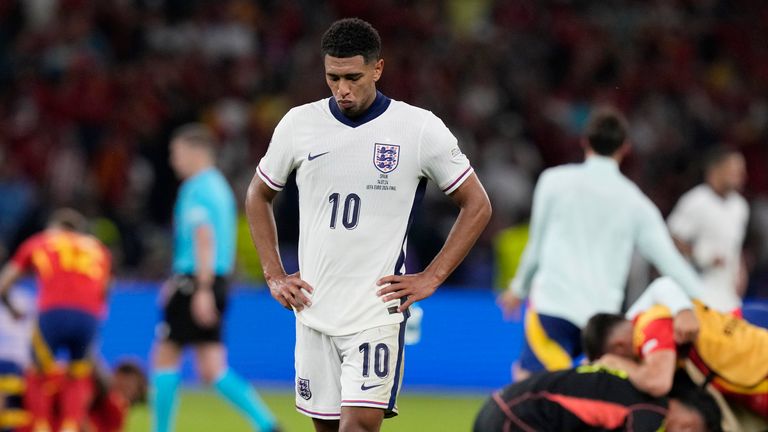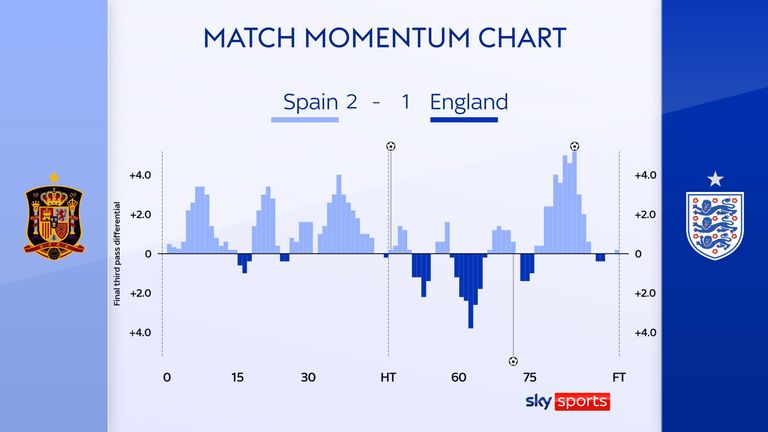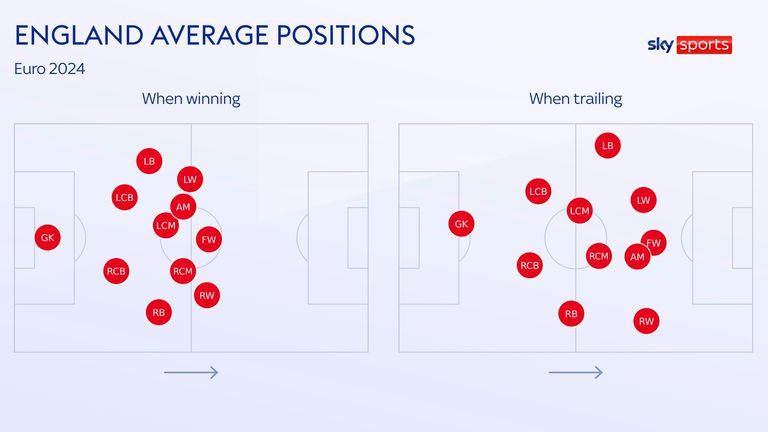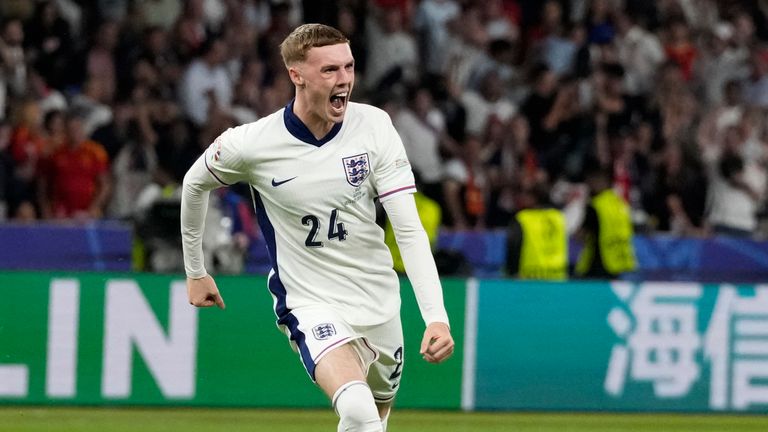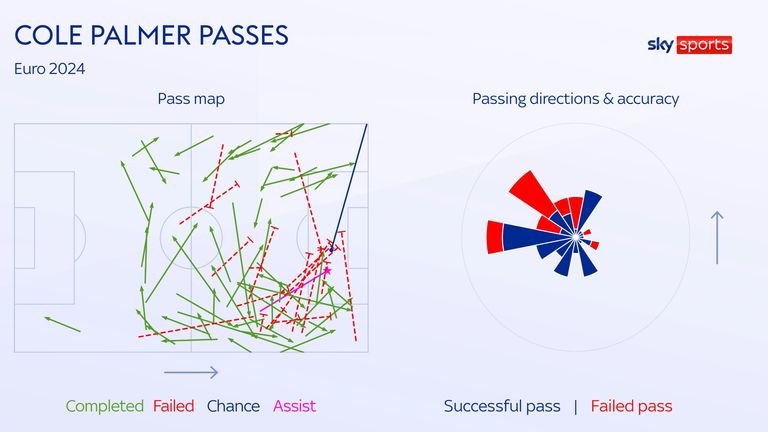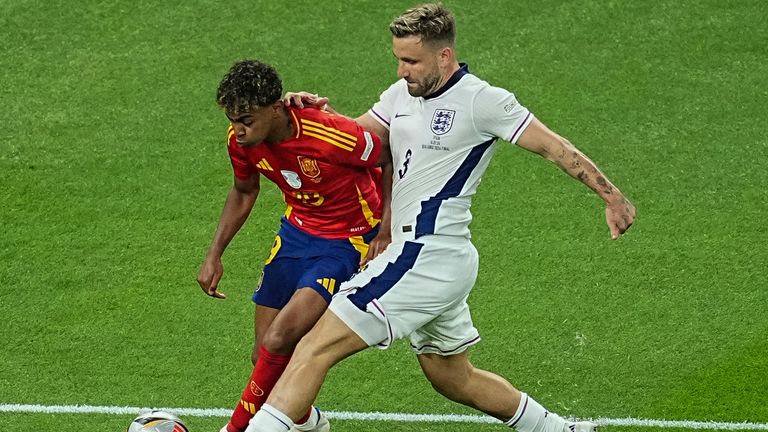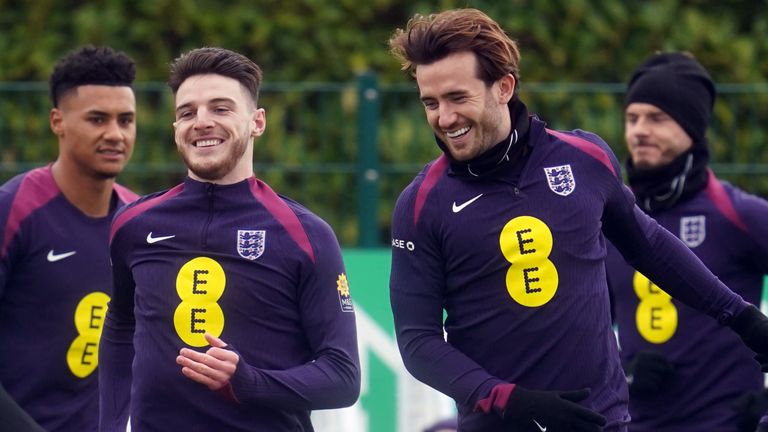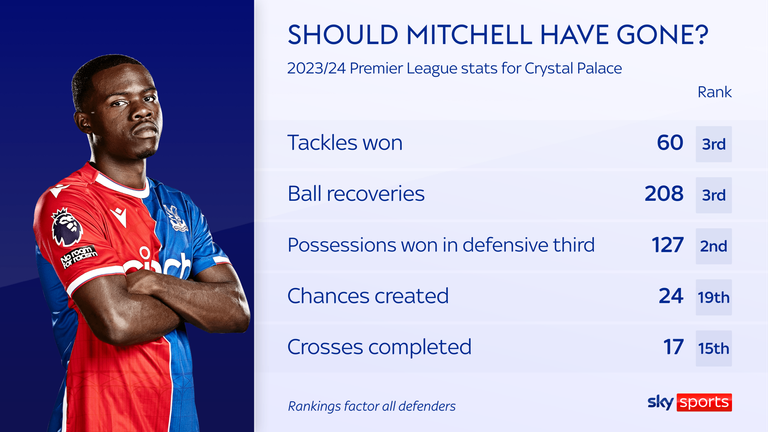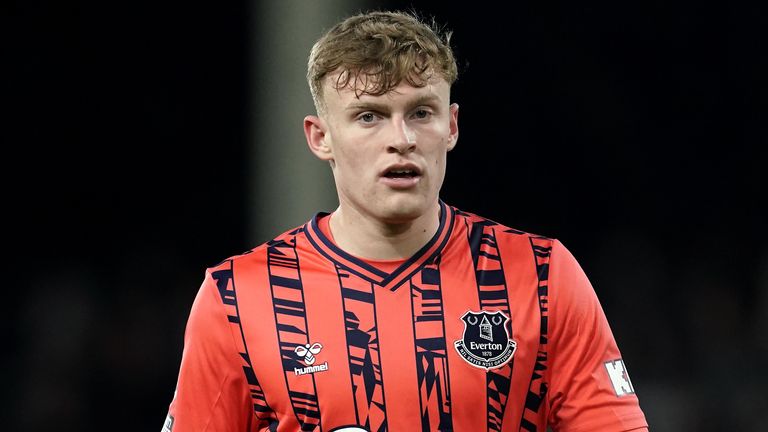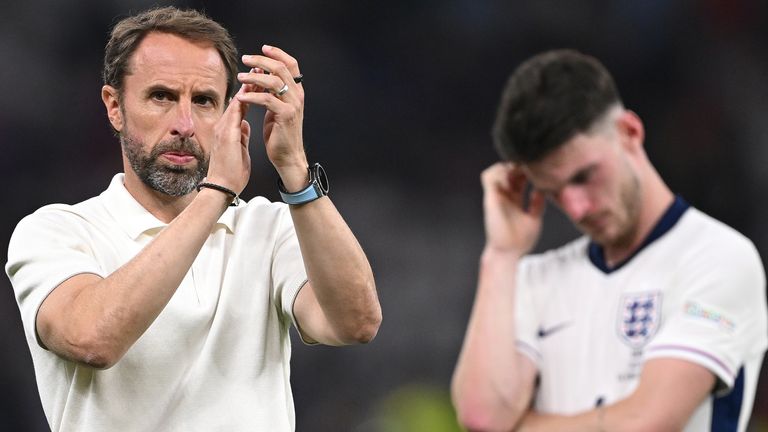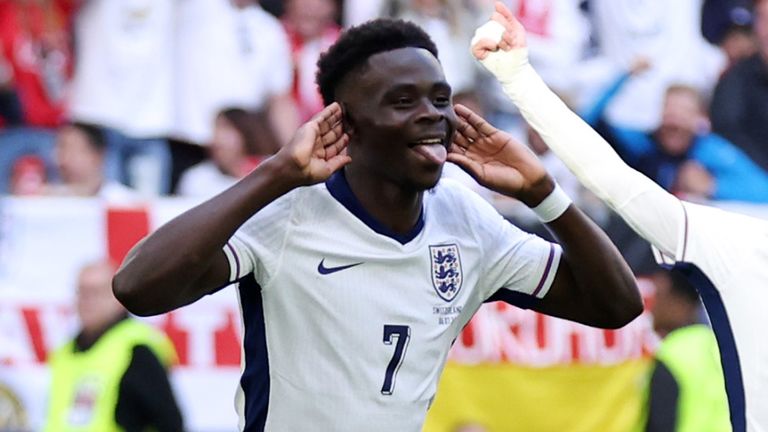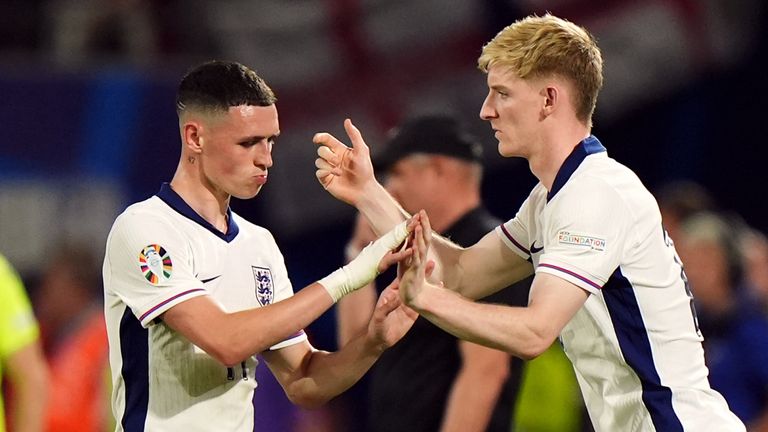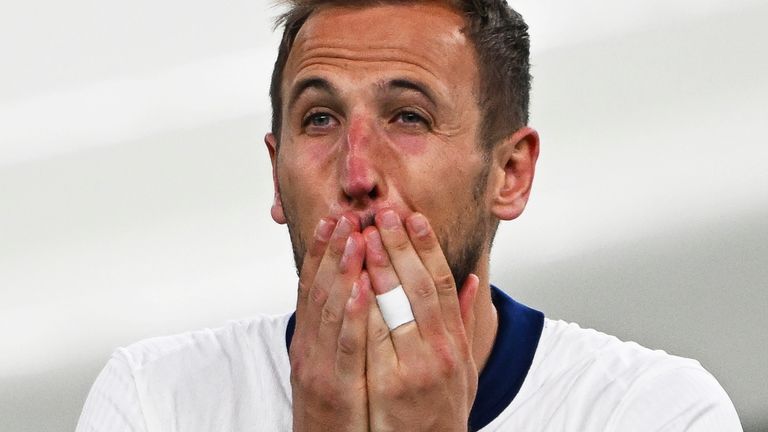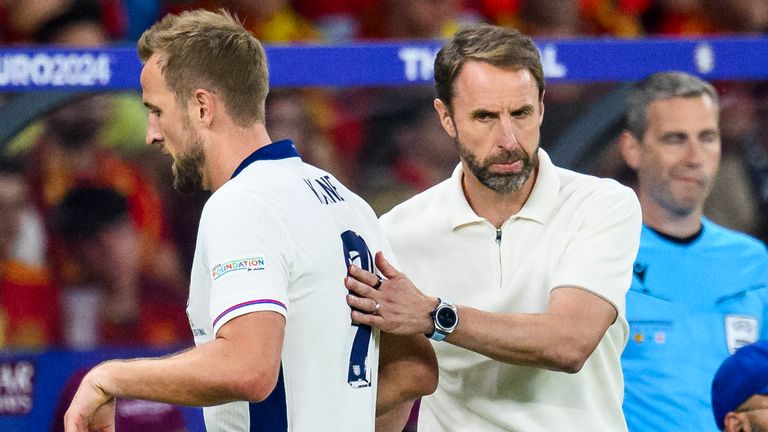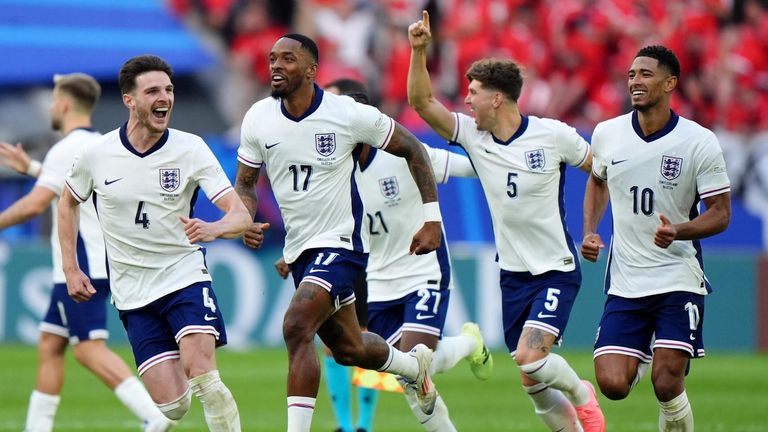[ad_1]
England’s Euro 2024 campaign ended in disappointment after a 2-1 defeat to Spain in the final. The Three Lions’ wait for a trophy will now extend to 60 years by the 2026 World Cup, but what should they change to finally bring some silverware home?
Change the mentality
England’s problems with possession are not solely technical. Let’s not forget Declan Rice, Phil Foden and Jude Bellingham all excel in ball-dominant club sides. Kobbie Mainoo is a brilliant technician with all the qualities required to keep the ball under pressure.
This is hardly a limited midfield.
The real challenge is to change the side’s mentality in knockout ties against top opposition. Gareth Southgate bemoaned England’s struggles in keeping the ball against Spain but the reality is they did not look like a side that actually wanted it.
Instead, they retreated under the comfort blanket of sitting back and trying to soak up pressure right from the start of the game, only seeking to impose themselves when they had to, after falling behind to Nico Williams’ opener soon after half-time.
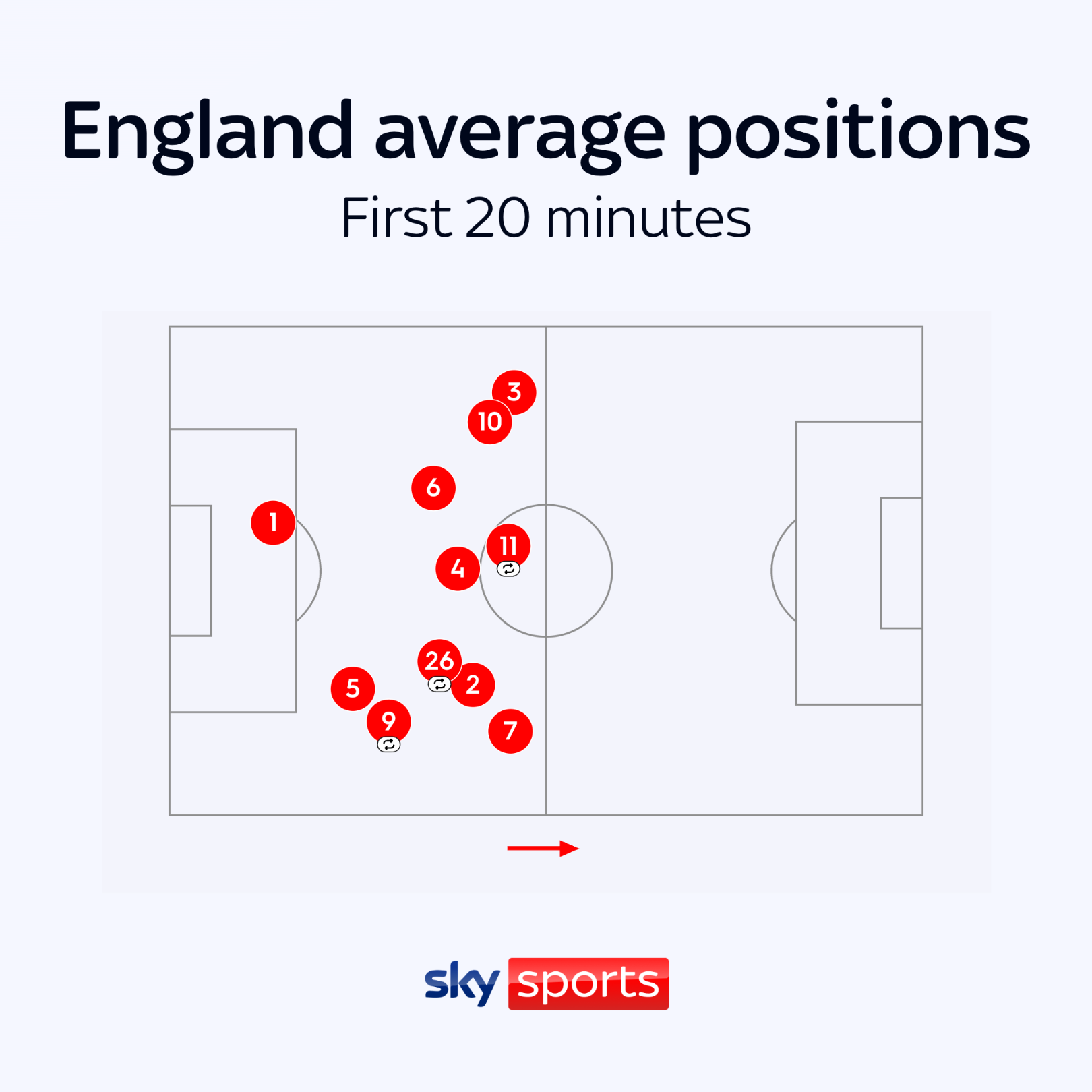
The change of emphasis paid off as Cole Palmer equalised. But once again they ceded the initiative, the instinct being to protect their position rather than strengthen it. Their passiveness ultimately allowed Spain to push forward and score the winner.
This pattern was apparent throughout the tournament, even against lesser opponents. If England are to take the next step and become team capable of dominating big games, they need to at least try to play like one. And it starts with mentality, not personnel.
Nick Wright
Shake up the attack with Palmer
Cole Palmer was one of the Premier League’s best players last season. The second highest for goals scored (22) and assists (11), third highest for shots. He almost single-handedly dragged Chelsea into sixth place.
It’s not just his stats that are impressive. His positive, forward-thinking play, ability to find those spaces and the players running beyond him, his eye for a pass and, of course, his goalscoring instinct. He can also contribute defensively too.
But when England were crying out for all of the above, when goals were needed, it is shocking that Palmer – who can play in most attacking positions – was not starting.
When the Three Lions needed a shored-up midfield, in came Kobbie Mainoo. But Gareth Southgate seemed unwilling to disrupt his attack, despite there being a lack of creativity for much of the tournament.
He wanted continuity with the XI, but that is exactly what needed to be ripped up at times. And Palmer proved when he did come on just what a livewire he is, assisting Ollie Watkins’ winner in the semis and scoring a trademark goal against Spain.
You wonder what could have been. Palmer – along with other attacking players who were restricted in minutes – could have added so much to England’s play and make for a more positive overall tournament.
Palmer will be an England regular for years to come. But in this moment, it feels like an opportunity missed. Here’s hoping that does not happen again.
Charlotte Marsh
Bring a Plan B left-back who is actually left-footed
Southgate probably didn’t realise quite how prescient his description of Luke Shaw as his “gamble” was before England even left for Euro 2024.
At the time, he hoped to have the Man Utd left-back fit to face Denmark in the second group game, but in the end he did not feature in Germany until the quarter-final with Switzerland almost two weeks later.
By that point the gaping hole on the left-flank as right-footed Kieran Trippier filled in had been exposed and become the main source of growing frustration towards Southgate.
His propensity to cut inside, coupled with the manager’s insistence with playing the centrally-inclined Phil Foden on the left, created a problem. One very much of his own making.
Even though England’s left-back depth is among the worst in the squad, there were options available.
Ben Chilwell had not played for Chelsea since April but was fit enough to make the squad for their final game of the season – three months since Shaw’s last match, at that point – and had started both of England’s friendlies in March.
Crystal Palace’s Tyrick Mitchell clearly did not make enough of an impression on Southgate to add to his one call-up, and two caps, from the March 2022 internationals.
That is no reason to ignore him in the face of England’s desperate need now though. Especially given his consistency for Palace across a number of years.
Given his time again, you imagine Southgate would find room in his 26-man squad for another natural left-back. It didn’t end up costing England, as Shaw ironically made his only start in the one game they lost.
But could it have helped win the group quicker, giving other players more of a chance to rest? Could it have helped England to find their rhythm quicker? It’s impossible to say, but it’s fairly conclusive that Southgate’s thinking around that position will go down as a mistake.
Ron Walker
Refresh the squad
The end of the Euros marks the end of a cycle. England must now begin preparing for the 2026 World Cup, meaning there are some tough calls for the manager – whoever that may be.
In two years’ time, Kyle Walker and Kieran Trippier will be 36 and 35, respectively. Now is the time to look to the future at full-back.
Efforts must be made to accommodate Trent Alexander-Arnold, while Reece James and Ben Chilwell must be recalled if they can stay fit. Tyrick Mitchell, Rico Lewis and Tino Livramento must also come into consideration.
John Stones is only 30 and is likely to remain on the scene, but with Lewis Dunk already 32, Levi Colwill and Jarrad Branthwaite should be promoted to the squad.
There’s also a lingering issue at No 9. Like Stones, Kane will only be 32 at the World Cup, but who ultimately replaces him is hard to answer.
Ivan Toney and Ollie Watkins are 28 and the U21s doesn’t inspire confidence. Will Jude Bellingham or Cole Palmer have to step in as makeshift No 9s? Trialling that idea in the upcoming Nations League could make sense.
Joe Shread
Pick a formation – and stick with it
England’s tactical flexibility has been a strength of Southgate’s reign, demonstrated again with their successful switch to a 3-4-3 formation for the wins over Switzerland and Netherlands.
But that made Southgate’s decision to revert to a 4-2-3-1 – used in England’s moribund performances against Serbia, Denmark, Slovenia and Slovakia – for the final particularly curious. Perhaps inevitably, another poor performance followed.
But in truth, it felt as though Southgate was chasing his tail in Germany. It’s never ideal when the manager is trying to work out their best XI and preferred formation during the tournament they’ve spent 18 months preparing for.
This was even more surprising given how well-drilled England were at previous tournaments under Southgate.
Whoever leads England into the World Cup, they need to put firm plans in place over how to bring the best out of their key players – and then use the next two years to fine tune them.
Joe Shread
Pace crucial to England’s future
A vital ingredient for any successful football team is pace. England lacked it at Euro 2024, and it showed throughout the tournament as they struggled to stretch teams.
The likes of Phil Foden, Jude Bellingham and Harry Kane – all brilliant players in their own right – all fought for the same space as they looked to drop deep and get on the ball, but it left England without a threat in behind opposition defences, making them easy to defend against.
There was a stark contrast between the finalists on Sunday and it was the pace of Nico Williams and Lamine Yamal, who were a constant threat to the England defence. Sky Sports‘ Roy Keane said of Spain: “The best team won the tournament. They’ve got a lovely mix, they’ve got pace, they’ve got youth, they’ve got experience. They’ve got talent and have worked their socks off.”
England have plenty of the above attributes mention by Keane, but that one vital ingredient of pace was missing in Germany.
It’s not that England don’t have the options in their squad. We saw what pace and energy could bring when Ollie Watkins was given the opportunity from the bench against Netherlands in the semi-final and then there’s the electric pace of Anthony Gordon, who was used sparingly by Gareth Southgate. Bukayo Saka also had his moments from the right, but he was too often ploughing a lone furrow for the Three Lions.
Part of the problem was Southgate’s insistence on squeezing both Foden and Bellingham into the same team. Are we falling into the same trap previous regimes fell not when trying shoehorn Steven Gerrard, Frank Lampard and Paul Scholes into the same starting XI? We’ve been there before, and experience tells us that it doesn’t work.
For the good of England’s long-term success, difficult decisions need to be made and the Three Lions need a threat on both sides of the pitch. Two out and out wingers with pace is a must for the future, and it may even just bring the best out of Kane again.
Oliver Yew
Solve the Kane conundrum
It’s a testament to Kane’s goal-scoring instinct that he still managed to finish as Euro 2024’s joint-top scorer despite being so ineffective for most of the tournament.
It seems obvious Kane carried the back injury that hampered the end of his season into the tournament, with Southgate admitting his captain had endured a “tough period”.
That’s putting it mildly. Perhaps it was due to the lack of players running beyond him, but Kane registered just 4.31 passes in the final third per match – 49th among all forwards.
Even more damning was that only six forwards at Euro 2024 mustered fewer than his 25.69 touches per game.
Kane wasn’t helping England to build the play but he wasn’t an effective presence in the box either, ranking 37th among forwards for touches in the opposition box.
If Kane is to remain England’s focal point – and given he’s only 30 and remains their best striker, he should do so – then fixing the attack must be high on the agenda.
Joe Shread
Learn to embrace possession
There has been a familiar failing for Southgate’s England in major tournaments – losing the midfield battle in the biggest moments.
Croatia in 2018. Italy in 2021. France in 2022. And now Spain in 2024. England emerged from all four encounters with defeats, as well as questions over why they can’t control games against quality opponents.
Partly, it’s through choice. The desire to sit back and defend after scoring has been such a consistent theme of Southgate’s tenure that it’s impossible not to think it’s all been part of the plan.
But it’s also down to personnel. Declan Rice’s best football came as a No 8 last season but, pressed into action as a holding midfielder at Euro 2024, he had a poor tournament and was outclassed by the imperious Rodri in the first half of the final.
England also lack a midfielder like Fabian Ruiz, someone who excels both in and out of possession. Kobbie Mainoo is the obvious English alternative but he remains a work in progress, as his nervy display in Berlin showed.
Adam Wharton, a naturally gifted passer, must be given opportunities during the Nations League. But most of all, England need to embrace possession. History has shown that, in the biggest games, they cannot win without it.
Joe Shread
It’s not all bad, is it?
Best formations, starting XIs and the right substitutions – we all think we know more than the person in the dugout.
Yes, you may argue Ollie Watkins should have started in place of a struggling (yet joint-top scorer) Harry Kane. Or perhaps you think Cole Palmer should have featured more than he did. However, this England team have proven the plan is working and it just needs a tweak, rather than wholesale changes.
For years the fans have wanted to see a men’s side with that major tournament nous. That ability to win ugly, produce under pressure and deal with all the noise. This England team delivered a 95th-minute overhead kick equaliser in the knockouts, a perfect set of penalties when it mattered, plus dealt with plenty of criticism off the pitch. They have reached the final of consecutive European Championships – albeit coming up short against Italy and now Spain.
Off the field, the mood in the camp is unrecognisable to how it was a decade ago. There are no club-based dressing room divisions of the past. There is a sense of unity within the group. Even when facing the media, there is no apprehension – and instead a darts tournament against the press pack. All that and more is down to Gareth Southgate.
He has shown he can be ruthless too – for example dropping the likes of Jordan Henderson and Marcus Rashford from his Euros squad or taking his captain off in the final after 60 minutes. Perhaps a bit more of that will be needed when picking his teams of the future – if he stays on.
England were rock bottom when Southgate took over in 2016. A World Cup semi-final appearance and two Euros finals have followed.
This England team are in a fantastic place. Yes those 58 years of hurt go on for now. However, some minor tweaks in personnel by whoever is in the dugout come that next major tournament and soon England fans might be singing “it’s coming home” once again.
Sahil Jaidka
[ad_2]
Source link
